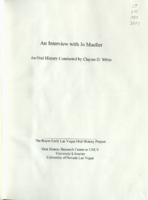Search the Special Collections and Archives Portal
Search Results
Herman van Betten Papers
Identifier
Abstract
The Herman van Betten Papers contain correspondence, campaign fliers, photographs, conference papers, and newspaper articles regarding his involvement in education, mental health matters, regional planning, and political issues in Nevada.
Archival Collection
John B. DuBois Papers
Identifier
Abstract
The John B. DuBois Papers (1967-2012) contain legislative bills, reviews, and requests from his time as a Nevada State Assemblyman from Clark County. Also included are newspaper clippings, campaign material, contribution letters, and election results. There are Datagraphic Research, Inc. Opinion Polls conducted and written by his wife Judith DuBois, photographs, speeches, and a manuscript for a stage play adopted from a novel written by John DuBois.
Archival Collection
Ruth St. Denis Collection
Identifier
Abstract
The Ruth St. Denis Collection (1916-1986) contains materials relating to the St. Denis School of Dance in Los Angeles, California. Included are scrapbooks containing magazine cutouts from early 20th century performers and celebrities and programs featuring St. Denis or performances honoring her memory.
Archival Collection
Southern Nevada Women's Political Caucus Records
Identifier
Abstract
The Southern Nevada Women's Political Caucus Records (1981-1992) document a chapter of the National Women's Political Caucus. It was active in child care issues and in aiding women who aspired to be elected to public office. Included are chapter bylaws, minutes, newsletters, and information on local child care and the Act for Better Child Care Services of 1987. Also included are records of forums, conferences, dinners, newspaper advertisements, financial records, and membership information. There is national information, including a bumper sticker, and a poster.
Archival Collection
Cork Proctor Papers
Identifier
Abstract
The Cork Proctor Papers document the career of comedian Cork Proctor from 1942 to 2012. The papers include photographs, programs, advertisements, and newspaper articles that illustrate both the longevity and influence of one of Nevada's most famous comedians. From 1972 to 2012, in both Reno and Las Vegas, Proctor consistently worked as a stand-up comedian, writer, and roaster.
Archival Collection

John McKay interview, March 3, 1980: transcript
Date
Archival Collection
Description
On March 3, 1980, Donna Malloy interviewed John McKay (b. July 7th, 1926 in North Dakota) about his life in Las Vegas, Nevada. McKay begins by speaking about his family history, his career in the electronics and engineering field for aerospace, as well as his experiences in two wars. Moreover, McKay speaks about his hobbies of hunting and fishing and his time as a musician around Las Vegas. McKay also spends time going over how the city of Las Vegas has grown and changed, the increase in crime, and the extreme floods in the 1950s. Lastly, McKay talks about the Nuclear Test Site, how casino gaming chips were used as money around the city, how the city of Las Vegas started and the future of the valley.
Text

Transcript of interview with Sarah & Joni Fried by Barbara Tabach, March 4, 2016
Date
Archival Collection
Description
The website for Freed’s Bakery happily displays the headline: Baking Sweet Memories Since 1959. Today the third generation of Frieds (correct spelling of the family surname) is hard at work creating incredible wedding cakes, cookies, and delightful desserts for the Las Vegas valley. For this oral history interview, Joni Fried, her daughter Sarah Fried, and nephew Max Jacobson-Fried sit to share stories of working in the family business started by Joni’s parents Milton and Esther Fried. Joni has handed the reins over to the third generation who invest their delicious souls into maintaining this Las Vegas tradition. Their tales range from childhood memories of holidays baking and cleaning to their personal favorite desserts. They also explain the impact on their business as early adapters of computer technologies and social media marketing. In October 2017, Freed’s Bakery landed a TV show, Vegas Cakes, on the Food Network.
Text

Transcript of interview with Jo Mueller by Claytee White, August 26, 2011
Date
Archival Collection
Description
Jo Ann and Hal Mueller arrived in Las Vegas in 1956 when he accepted a meteorologist position. In addition to raising their two children, Jo was active in PTA, worked for Weight Watchers, and was a volunteer with League of Women voters. She tells the story of meeting Hal and their whirlwind romance to the altar, moving to the Caroline Islands and eventually choosing Las Vegas over Seattle as their next career assignment. Las Vegas became their permanent home and Jo reflects on life and experiences here.
Text

Transcript of interview with Daryl Morris by Barbara Tabach, February 16, 2016
Date
Archival Collection
Description
Daryl Morris discusses growing up in Las Vegas and his love of acting.
Daryl Morris is a native of Las Vegas. Born in 1961, he is one of three sons born to Paula and Bobby Morris. He recalls his childhood of the 1960s and 1970s with great fondness of the fast friendships formed within the Jewish community. His day job is in insurance, but his great love is for acting. He tells of being smitten at the age of 11 and taking acting lessons as a youngster and then later studying with actor Jeff Goldblum. He has an impressive list of films in which he has appeared, including the opening scene of Mall Cop 2. He enjoys voice-over acting and teaching acting classes. He also tells about his Navy service, attending UNLV, and coming to settle in Las Vegas-the place he calls home. Daryl also participated in the January 31, 2016, Growing Up Jewish in Las Vegas panel discussion for the Southern Nevada Jewish Heritage Project.
Text

Transcript of interview with Mike and Susan Baller by Barbara Tabach, March 16, 2016
Date
Archival Collection
Description
In this interview, Mike and Susan Baller reflect upon their lives in Las Vegas, from growing up as teenagers amongst the tight-knit Jewish community, to mob influence on the city, and the impact of the city's growth. Mike shares stories about first arriving in Las Vegas to live, being a teenaged busboy at Binions Horseshoe to being related to Moe Dalitz -- in Michigan Mike drove a truck for the Dalitz dry cleaning business.
Text
